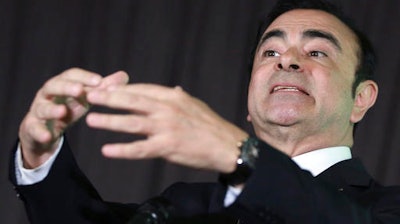
YOKOHAMA, Japan (AP) — Nissan Chief Executive Carlos Ghosn is confident a 237 billion yen ($2.2 billion) investment in a controlling stake in scandal-embroiled Mitsubishi Motors will prove a bargain when sheer size is critical in the auto industry.
Japanese transport ministry officials raided Mitsubishi Motors Corp.'s Tokyo headquarters Friday, as part of an investigation into inflated fuel-economy data for several models.
Ghosn was careful to stress the acquisition won't become final until he sees the outcome of the Japanese regulators' investigation, such as the scale of the fraud, whether overseas markets are affected and what the penalties might be.
But scale is critical for developing expensive technology such as low-emissions vehicles and autonomous driving. So is the advantage of being in various markets to balance ups and downs in regional growth, he said.
"If you are small, you are going to be vulnerable," Ghosn told reporters at Nissan Motor Co.'s Yokohama headquarters Friday, a day after he announced the agreement.
Ghosn acknowledged he grabbed at an opportunity as Mitsubishi shares nose-dived after the latest scandal surfaced.
Mitsubishi's shares fell 43 percent between April 19 — the day before it announced the fuel economy scandal — and May 11. The stock cost 565 yen ($5.20) Friday, down 1.7 percent following a surge on the deal's news.
Gaining Mitsubishi adds about 900,000 in annual vehicle sales to the Nissan-Renault alliance, which already is the fourth-largest automaker in the world with about 8.5 million in sales.
The deal vaults the alliance into competition for the top spot with the world's three biggest automakers, Toyota Motor Corp., Volkswagen AG and General Motors Co.
The plus for Nissan is the added economies of scale, such as sharing auto parts, working together on sport-utility vehicles, and gaining markets in Southeast Asia, where the Mitsubishi brand is still strong, said Paul Newton, an analyst with IHS.
"The purchase will give them an effective controlling stake and is somewhat opportunistic, as $2.2 billion is not a huge sum for such a significant chunk of the company and could be seen as something of a bargain," he said in an email.
The 34 percent stake is below the threshold for which Nissan would be liable for Mitsubishi's debts under Japanese law, Newton said.
Mitsubishi could face massive expenses to compensate car owners for the overstated mileage and pay government fines. But Mitsubishi has already promised to compensate Nissan for lost sales as well as any penalties and costs from the scandal, Ghosn said.
Nissan found the faked mileage tests because of a discrepancy with its own tests on Mitsubishi-manufactured minicar models with tiny engines that had been sold under the Nissan brand.
Ghosn stressed that regaining consumer trust is the No. 1 challenge for Mitsubishi.
In the early 2000s, Mitsubishi disclosed a massive cover-up of defects such as failing brakes, faulty clutches and fuel tanks prone to falling off, dating back to the 1970s. Mitsubishi has said its mileage rigging dates back 25 years, and may involve all its models, including discontinued ones.
Ghosn engineered the revival at Nissan after being sent by Renault SA of France in 1999. Nissan was in deep debt and unprofitable then, but Mitsubishi has 450 billion yen ($4 billion) in cash and is managing an operating profit, Ghosn noted.
"The financial situation of Mitsubishi is not bad," he said.





















